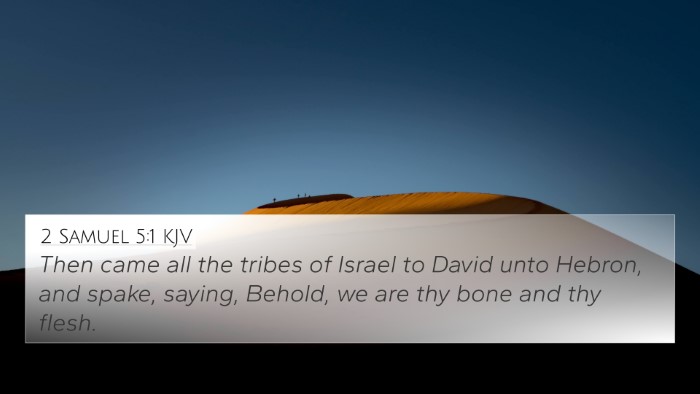Understanding 2 Samuel 16:18
2 Samuel 16:18 states: "And Hushai said unto Absalom, Nay; but whom the LORD and this people and all the men of Israel choose, his will I be, and with him will I abide." This verse captures a moment during Absalom’s rebellion against his father, King David. Hushai, a counselor, declares his loyalty amidst political turmoil.
Key Themes and Insights
- Loyalty and Allegiance: Hushai’s response illustrates the importance of loyalty in leadership. He aligns himself with Absalom, despite the rebellion, highlighting the complexities of human relationships during conflict.
- The Sovereignty of God: Hushai’s use of "whom the LORD... choose" implies a recognition of divine authority in human affairs, reflecting a theme prevalent in Biblical narratives where God directs the course of events.
- Political Schemes: Hushai’s political maneuvering serves as a reminder of the strategic alliances formed in times of conflict, showcasing human ingenuity alongside divine guidance.
- Contrast with David: Hushai’s allegiance to Absalom serves to contrast David’s character, emphasizing the challenges faced by leaders in times of betrayal.
Commentary Insights
Matthew Henry
Matthew Henry notes that Hushai’s declaration is significant not only for its political implications but also for its reflection on divine will. Henry emphasizes that true alignment is with God's chosen leader.
Albert Barnes
Albert Barnes provides insight into the political climate, explaining that Hushai's statement represents a pragmatic approach to navigating the complexities of loyalty during Absalom's insurrection. Barnes elaborates on how earthly wisdom must often complement divine purpose.
Adam Clarke
Adam Clarke sheds light on the contrast between Hushai’s wisdom and the folly of Absalom. He suggests that this moment underscores the necessity of spiritual discernment in political matters.
Bible Verse Cross-References
2 Samuel 16:18 connects with numerous other Scriptures that deepen our understanding of its themes:
- 2 Samuel 15:31: David learns of Ahithophel's defection, illustrating the internal conflict and betrayal.
- 1 Kings 1:8: Another rebellion against King David, demonstrating the challenges of leadership.
- Psalm 3:1-2: A reflection of David's distress during Absalom's rebellion, showcasing parallels in emotional turmoil.
- Proverbs 14:12: Wisdom concerning the ways of man, which can lead to unexpected outcomes, highlighting the need for divine guidance.
- 1 Chronicles 12:18: The loyalty of men during David's reign serves as a backdrop to understand Hushai’s choice.
- 1 Samuel 13:14: God's selection of leaders, illustrating the theme of divine choice in guiding political affairs.
- Psalm 37:5: A call to commit one’s way to the Lord in times of uncertainty, which aligns with Hushai’s recognition of God’s sovereignty.
- Ecclesiastes 9:11: Reflects on chances in life and the uncertainties of human wisdom in political matters.
- Matthew 6:33: Seeking first the kingdom of God parallels Hushai’s conscious decision to align with God's chosen people.
- Romans 13:1: Reminds believers that all authority comes from God, emphasizing the need for divine acknowledgment in leadership.
Connections Between Bible Verses
This verse exhibits clear connections with various passages throughout Scripture:
- Identifying Connections: Understanding the dynamics between Hushai's loyalty and David’s struggles can be illuminated through cross-references with passages outlining rebellion and allegiance in both Old and New Testaments.
- Comparative Analysis: By comparing Hushai’s words to New Testament themes of loyalty and truth, one can draw parallels with how believers are called to navigate social and political challenges.
- Cross-Referencing Biblical Texts: Themes of loyalty and divine sovereignty resonate across Biblical narratives, allowing for comprehensive studies of loyalty in leadership, evident from King David through to New Testament teachings.
How to Use Bible Cross-References
To deepen your understanding of 2 Samuel 16:18 and its context, employing a Bible cross-reference guide can be beneficial:
- Utilization of Bible Concordance: Finding related verses providing further context and insight.
- Cross-Reference Bible Study: Engage in a systematic approach to identify connections between similar themes present in various scriptures.
- Cross-Referencing Bible Study Methods: Use thematic studies that explore similar narratives or moral teachings that enrich understanding.
Conclusion
In 2 Samuel 16:18, Hushai’s response not only illustrates the complexities of loyalty and the sovereignty of God. By cross-referencing this verse with related Scriptures, believers can gain a deeper understanding of themes central to governance, divine authority, and human relationships amid conflict.




